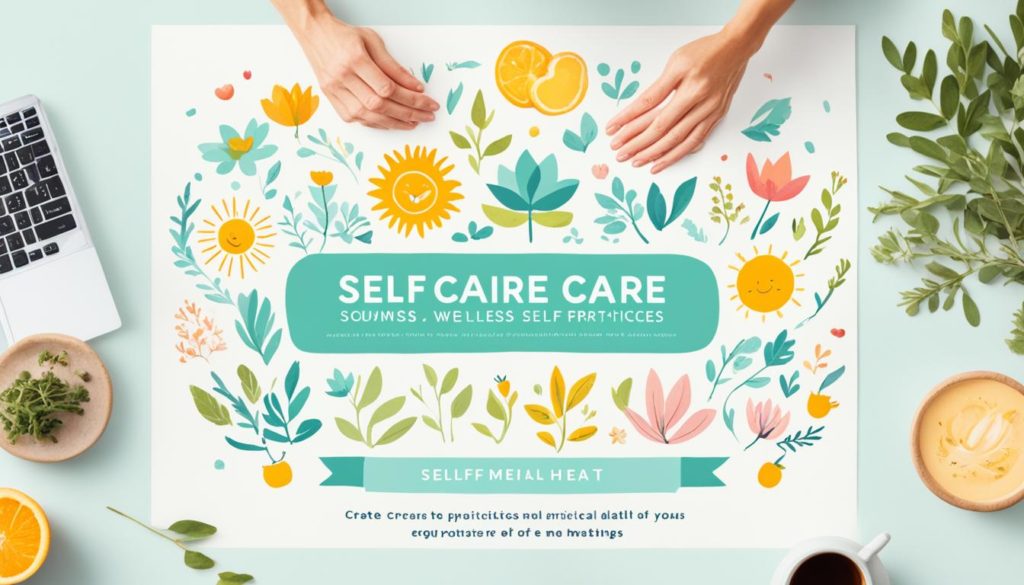It’s early morning and the city is stirring to life. You’re at your kitchen window, holding a warm cup of coffee. This moment is just for you, before the busy day starts. It’s a quiet time that brings peace every day. This simple act is part of your self-care practices, important for your mental health. You’ve found that well-being comes from moments like these. These moments are often missed in our busy lives.
Remember when life felt like you were juggling too much? Self-care was the first thing you stopped doing. Burnout was always close by, making each day hard. But when you made self-care part of your daily life, things changed. It became a key to staying strong, even when things got tough. You see self-care as a tool to help you through hard times now. It helps you stay steady, no matter what comes your way.
Key Takeaways
- Acknowledge the value of simple, daily self-care practices for lasting wellness.
- Understand that self-care is integral to maintaining mental health care.
- Recognize the importance of incorporating self-care into your routine to achieve daily peace.
- Consider self-care a necessary resilience-building approach, not merely a luxury.
- Empower yourself to face life’s stressors with a personalized self-care plan.
Understanding Self-Care: A Holistic Overview
Starting your self-care journey is key to living a balanced and energetic life. Daily life can make us forget the importance of taking care of ourselves. However, adding thoughtful wellness activities to your day helps prevent burnout. Self-care changes with your needs and life stages.
Consider these elements for a balanced self-care routine:
- Addressing physical health through regular exercise and proper nutrition
- Maintaining social connections for emotional support and companionship
- Expanding your knowledge and skills for mental stimulation
- Seeking spiritual fulfillment, whether through meditation, nature walks, or other personal endeavors
Combining these areas creates a framework of activities that rejuvenate your whole self. Here’s a table showing some wellness tips to build your self-care plan.
| Physical | Social | Mental | Spiritual |
|---|---|---|---|
| Daily walks or yoga sessions | Weekly coffee dates with friends | Learning a new language or skill | Daily meditation or reflective journaling |
| Hydrating and nourishing meals | Community service or group activities | Creative arts, such as painting or writing | Exploring nature trails or parks |
| Adequate rest and sleep hygiene | Regular video calls with distant loved ones | Puzzle games or brainteasers | Attending spiritual gatherings or reading inspirational texts |
Adding these activities to your routine cares for your body, mind, and soul. This balance is vital. Remember, doing little self-care activities regularly is better than big, rare ones.
“Care for your body, mind, and spirit, and your time will care for you.” – A mantra for holistic wellness.
On your self-care path, keep checking on your needs and adjust. Your self-care plan should be unique. It helps you stay lively, focused, and calm through life’s challenges.
Physical Self-Care: Nurturing Your Body
Taking care of your physical health is essential for a balanced lifestyle. It involves more than just exercising. It includes attending health care appointments and learning how to manage stress. Let’s see why regular exercise and good sleep are key to your self-care.
The Spillover Benefits of Regular Exercise
Regular physical activity is great for both your body and mind. It builds strength and improves your mental health. Exercise releases endorphins, boosting your mood and fighting off depression and anxiety. By working out regularly, you support your physical and emotional well-being.
Remember: Exercise is a celebration of what your body can do, not a punishment for what you ate.
Proper rest is just as important as exercise. Next, let’s talk about the critical role of sleep in well-being.
Sleep: The Unsung Hero of Well-being
Good sleep is crucial for your health. It helps with focus, memory, and body repair. Making rest a part of your physical self-care leads to a better start each day.
Exercise, sleep, and keeping up with health care appointments are all part of a healthy life. Here’s how they work together:
| Physical Self-Care Element | Benefits | Frequency |
|---|---|---|
| Regular Exercise | Increased stamina, mood enhancement, improved cardiovascular health | Daily or at least 3-4 times per week |
| Adequate Sleep | Mood stability, better cognitive performance, higher energy levels | 7-9 hours per night |
| Health Care Appointments | Early detection of issues, updated health status, professional guidance | Annually or as recommended by health care provider |
Your dedication to physical self-care shows you value your body and mind. By adopting stress management strategies, you’ll greatly improve your overall health. This all-around approach is key to a fulfilling wellness journey.
Emotional Self-Care: Navigating Feelings with Grace
Prioritize emotional self-care for a balanced health approach. It means caring for your inner emotional state on purpose. Learn to process emotions wisely and boost your overall well-being. Find out how to develop healthy coping skills and get better at sharing and handling your feelings with kindness and purpose.
Developing Healthy Coping Mechanisms
We aren’t born knowing how to handle complex emotions; it’s a skill that grows with practice and mindfulness. To build resilience, it’s key to have healthy coping skills that help you express and manage emotions positively. Whether it’s engaging in sports to relieve stress or using creative expressions for a break, discovering what suits you is crucial for emotional self-care.
The Art of Processing Emotions Effectively
Treating the ability to process emotions well is like mastering an art. It demands patience and insight. It’s about paying attention to your emotions’ messages and reacting in a way that fosters healing and progress. This might involve practicing mindfulness to focus your thoughts or getting support from friends or family when times get tough. By recognizing and working through your feelings, you make a space that helps emotional health.
| Emotion | Coping Skill | Benefit |
|---|---|---|
| Anxiety | Deep Breathing Exercises | Calms the nervous system |
| Sadness | Expressive Writing | Provides emotional release |
| Anger | Physical Activity | Channels energy positively |
| Stress | Mindfulness Meditation | Increases present-moment awareness |
Build your journey toward emotional self-care with self-compassion and confidence in your chosen coping methods. As you navigate and process emotions, know that every step and breath matters greatly to your emotional strength. Use these strategies not just to make it through, but to flourish, with an inner grace.
The Connection Between Self-Care and Mental Health
Starting your mental health care journey means understanding self-care’s importance. It’s more than relaxing. It means keeping your mind busy too. Activities like puzzles and reading are vital. They keep your brain sharp, similar to how exercise benefits the body.
Being kind to yourself, or self-compassion, is also key for mental health. It’s like a friendly voice that reminds you to go easy on yourself when unsure. Creating a positive inner dialogue is equally crucial. The things we tell ourselves greatly affect our confidence and life view.
Remember, the conversations you have with yourself can be as nurturing as the ones you have with others. Take time to meditate on your thoughts and ensure your inner dialogue supports your well-being.
Here’s a table showing self-care activities and their benefits for your mental health:
| Self-Care Activity | Mental Health Benefits |
|---|---|
| Engaging in puzzles and brain games | Improves concentration, enhances cognitive function |
| Reading inspirational literature | Boosts motivation, expands perspective |
| Watching educational or inspiring movies | Elevates mood, sparks creativity |
| Practicing meditation and mindfulness | Reduces stress, increases present-moment awareness |
| Journaling | Facilitates emotional processing, aids in self-reflection |
Self-compassion means treating yourself as you would a close friend. It includes taking time to rest and knowing it’s okay to make errors. By doing this, you make your mental health care routine better and feel more fulfilled.
Self-care is the gateway to a fortified mind and a nurturing soul. Remember, your mental health is a priority, and actively engaging in self-care is a testament to that.
Mental Self-Care: Keeping a Sharp Mind
Maintaining a strong mind is not just about doing puzzles or reading. It means engaging in mental self-care and mental stimulation that challenges you. Improving your mental sharpness helps in all areas of life. It makes you better at solving problems, dealing with emotions, and feeling satisfied. Effective self-care practices boost both your brain and mental health.
Mental Stimulation: Beyond Puzzles and Books
The world of mental stimulation is vast and exciting. Activities like learning new languages or playing a musical instrument do wonders. They not only entertain but also strengthen the brain, making it more flexible. These efforts improve your mental self-care routine.
- Enroll in online courses to explore new disciplines.
- Play strategy-based games that require critical thinking.
- Attend workshops or lectures on topics outside your expertise.
- Engage in creative hobbies like painting or writing.
Cultivating a Positive Inner Dialogue
Your self-talk significantly affects your mental health. Fostering a positive inner dialogue is key to self-care. It involves treating yourself with kindness and compassion. This approach promotes a strong and positive mental space.
- Practice gratitude by reflecting on positive aspects of your life.
- Challenge negative thoughts and replace them with affirmative statements.
- Meditate daily to center your thoughts and emotions.
- Keep a journal to process your experiences constructively.
Below, we match negative self-talk with empowering affirmations. This mental self-care method is simple but powerful.
| Negative Self-Talk | Positive Affirmation |
|---|---|
| I’m not good enough to succeed. | I am capable and prepared for my success. |
| I always make mistakes. | Mistakes are opportunities for growth and learning. |
| It’s too late to change. | It’s never too late to take steps toward change. |
| No one appreciates me. | I am valued and my contributions matter. |
Prioritizing mental self-care is crucial, whether it’s through puzzles, talks, or affirmations. Focusing on your mental needs strengthens your capacity to face life’s challenges. Always push your mind to grow. Remember, living a mentally fulfilling life means continuous learning and being kind to yourself.
Social Self-Care: Cultivating Relationships
In today’s fast-paced world, taking time for social self-care is vital. It’s crucial for your wellness. Building relationships takes more than just occasional meetings. It demands real effort to grow and keep close connections.
Each get-together, whether it’s a coffee meet, a park stroll, or a video call, means a lot. These moments build the network of your social world. Adding relationship nurturing to daily life leads to stronger bonds and a bigger sense of community.
The Power of Face-to-Face Connections
There’s something special about talking in person. In-person talks let us share experiences that are real and heartfelt. This kind of interaction boosts our feeling of being included. It reminds us of our supportive circle.
Maintaining Friendships Amidst a Busy Life
Keeping friends while busy is tough but important. It’s not about how much time you spend, but the quality. Plan wisely, like regular meet-ups or shared hobbies. This helps keep our close connections alive. They offer peace and comfort in our busy lives.
Self-Care Practices for Spiritual Wellbeing
Taking care of ourselves means more than just looking after our bodies. Our spirit needs attention too. Spiritual self-care helps you connect with your inner self and the universe. It supports your sense of purpose and helps you navigate life with meaning and peace.
Meditation is a key tool for spiritual wellness. It brings you into the moment, focuses your mind, and opens up your soul. Through meditation, you can find calm and enhance your well-being.
Adding spiritual practices to your day can be simple. Take moments to reflect, breathe, and be present. Gratitude and silent prayer can keep you grounded and focused on your purpose.
Here are some steps for spiritual self-care:
- Spend time in nature to feel connected to the earth.
- Journal to reflect on your growth and feelings.
- Try different meditations to see what suits you.
- Do volunteer work to join a bigger cause.
Spiritual self-care aims to create peace and an inner sanctuary of strength. Practices like meditation and mindfulness build a fulfilling life with a strong sense of purpose.
Mindfulness Techniques for Everyday Presence
Using mindfulness techniques throughout your day can turn ordinary moments into a quest for everyday presence and discovery. When you focus on the present, it opens paths for personal growth. It introduces effective stress management strategies that fit your lifestyle.
Integrating Mindfulness Into Your Routine
Start by adding simple practices to your daily routine. For example, try focused breathing during your morning commute. Or practice mindful eating at lunch. These small changes help you become more mindful. They lead to a calm and attentive mindset throughout the day.
Benefits of Consistent Mindfulness Practice
Regular mindfulness practice brings many benefits. You’ll enjoy better sleep and feel the joy from endorphins. It sharpens your mind, making it easier to face life’s challenges. By embracing mindfulness, you set the foundation for a peaceful and balanced life.
Strategies to Promote Work-Life Balance
Work-life balance is essential for our wellbeing. It’s about dividing time wisely between work and play. To achieve balance, we need to set clear limits and manage our time well. This way, we can enjoy a peaceful life.
Setting Boundaries for Increased Productivity
It’s vital to keep work and personal life separate. This prevents work from taking over your free time. By setting limits, you can do well at work and still enjoy life.
Creative Time Management for Self-Care
Managing time creatively helps make self-care a priority. It’s about doing what needs to be done in a smarter way. This approach helps avoid burnout and keeps you feeling fresh.

| Technique | Work Application | Life Application |
|---|---|---|
| Timed Work Blocks | Focus on a single task uninterrupted | Dedicated time for hobbies or family |
| Email Boundaries | Checking emails only at set times | Disconnecting from work communication post-hours |
| Delegation | Empowering team members with tasks | Sharing household responsibilities |
| Regular Breaks | Mental rest to maintain productivity | Intervals for personal care |
| Saying No | Turning down excess assignments | Declining activities that don’t serve well-being |
Improving work-life balance starts with setting boundaries. This process improves with clear communication and knowing yourself. Time management also plays a key role. It’s about prioritizing what truly matters, both at work and home. These methods lay the groundwork for a rewarding and balanced life.
Well-being and Leisure: The Role of Play in Self-Care
Taking care of your mental health can mean adding play in self-care. When did you last enjoy leisure activities just for fun? Such moments are not only enjoyable but also vital for a balanced life. Seeing play as part of overall well-being makes self-care more complete and fun.
Hobbies play a key role in stress relief. Engaging in hobbies without the need to be perfect lets your mind rest. It brings out your joy and creativity. Whether it’s unplanned or planned, as long as it makes you happy, it counts as play.
Let the simple joy of play be the spark that ignites your daily well-being habits, turning routine leisure activities into treasured self-care practices.
Here’s how you can add play into your daily life:
- Set aside time each week for a hobby you love, like gardening, painting, or playing an instrument.
- Do things that make you laugh, like playing games with friends or watching a comedy.
- Try new things to keep play interesting and varied.
- Go outside. The outdoors is a natural playground for all ages, promoting active play and health.
Leisure activities are key to a full life, not a break from being productive. Allowing play into self-care boosts happiness and mixes well-being with fun. So, why not start that pottery class, play soccer with locals, or play those old board games? The link between play and feeling refreshed is strong. It’s a good way to look after your health.
Self-Love Practices: The Foundation of Self-Care
Starting on the self-love path is a life-changing journey. It takes self-care from routine to artistry, focusing on well-being and confidence. Self-love is essential for inner strength. It encourages actions that make you feel worthy and able.
Self-love is more than feelings; it’s about actions that support you. This creates a supportive inner world. It lets you be your own cheerleader and supporter.
Building Confidence Through Self-Care Activities
For confidence, blend self-care actions with kindness towards yourself. This could be setting goals, celebrating small wins, or doing things you love. Each action is a step towards believing more in yourself.
The Journey of Self-Appreciation and Acceptance
Learning to value yourself is key. It involves accepting both your strengths and flaws. This journey is about seeing your growth and welcoming who you are.
With acceptance, you widen your self-care scope. This lays out a plan for full care and deep happiness.
| Self-Love Activity | Benefits |
|---|---|
| Journaling | Encourages introspection and emotional release |
| Meditation | Enhances mental clarity and reduces stress |
| Physical Exercise | Boosts endorphins and improves self-image |
| Positive Affirmations | Strengthens mental resilience and fosters a positive mindset |
| Creative Hobbies | Provides a sense of achievement and personal satisfaction |
Self-love is a journey, not a destination. By making these practices part of your life, you will see how self-love and confidence journey together. They create an inspiring story of self-care and discovery.
Stress Management: Self-Care to Stay Unruffled
To manage stress well, start by identifying stress triggers in your daily routine. It’s important not just to react to stress. You need to find and solve issues proactively to stay calm. Recognizing your main stressors, like tight work deadlines or personal tasks, is critical.
Identifying Stress Triggers and Crafting Solutions
Begin by keeping a diary of when and why stress levels rise. Look for patterns, like certain times, places, or interactions that increase stress. After identifying these triggers, work on strategies to manage them. This could mean changing your surroundings, how you react to situations, or setting limits.

Relaxation Techniques as Self-Care Tools
Once you know your stress triggers, add relaxation techniques to your self-care plan. These methods should match your preferences and lifestyle. It’s crucial to find what relaxes you the most because each person is different.
| Relaxation Technique | Benefits | How to Implement |
|---|---|---|
| Deep Breathing Exercises | Reduces tension, improves oxygen flow | Schedule short breaks for focused breathing throughout your day |
| Progressive Muscle Relaxation | Relieves muscle tightness, enhances awareness of physical sensations | Practice tensing and relaxing different muscle groups progressively |
| Mindfulness Meditation | Increases present-moment awareness, reduces anxiety | Set aside a daily timeslot for quiet reflection and focus on the present |
| Yoga or Tai Chi | Combines physical activity with mental focus, improves flexibility | Join a class or follow an online session to guide you through the practice |
| Nature Walks | Boosts mood through exposure to natural light, provides gentle exercise | Incorporate short walks in natural settings into your weekly schedule |
Making relaxation techniques a part of your life is like preventive healthcare. This can include mindfulness practices, meditative exercises, or staying active. By making these activities a regular habit, you’ll learn to handle stress better. You’ll feel more peaceful, even when life gets busy.
Holistic Wellness Tips: A Comprehensive Approach
For a true state of well-being, adopting holistic wellness tips is crucial. Including nutrition, consistent physical activity, and mental health strategies in everyday life ensures lasting vitality. A balanced life means more than quick fixes; it’s about building a lifestyle that lasts.
Three key pillars make up holistic wellness: nutrition, physical activity, and mental resilience. Each plays a vital role in health. Together, they create a strong foundation for optimal wellness.
| Holistic Pillar | Key Benefits | Practical Tips |
|---|---|---|
| Nutrition | Energy, Cognitive Function, Disease Prevention | Eat a rainbow of fruits and vegetables, incorporate whole grains, choose lean proteins |
| Consistent Physical Activity | Increased Stamina, Weight Management, Mood Enhancement | Engage in at least 30 minutes of moderate activity daily, mix cardio with strength training |
| Mental and Emotional Strategies | Stress Reduction, Improved Relationships, Enhanced Self-Awareness | Practice mindfulness meditation, journaling, positive affirmations |
By working on these wellness aspects, you’ll feel healthier and happier. It’s about caring for your body, thinking positive, and enjoying movement. These practices bring joy and fulfillment to daily life.
Start your holistic wellness journey now. Live a balanced life, where balance is not just a goal, but a beautiful reality.
Personalized Self-Care Routines: Tailoring to Your Needs
Your self-care should be as special as you are. It’s not a one-size-fits-all deal, but a custom guide. It helps you meet your personal needs with precision. Knowing your own lifestyle, challenges, and goals is key. This is your first step in making a self-care plan that really works for you.
Assessing and Addressing Personal Self-Care Needs
Starting this journey means looking honestly at your self-care habits. You might need to change your exercise, sleep, or relaxation time. Each adjustment is a step to making your self-care fit you better. Checking in with yourself helps you see different parts of your life. It shows where you might need to focus more, helping you make choices that keep you healthy.
The Importance of Regular Self-Care Assessments
Life changes every day, bringing new challenges and changes. That’s why keeping up with regular self-care checks is crucial. They help your self-care grow with you. These checks let you listen to your body and mind, making changes as needed. By doing this often, you keep improving your life’s quality.



